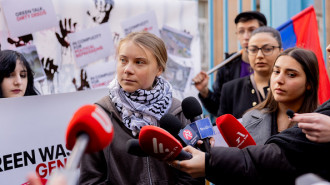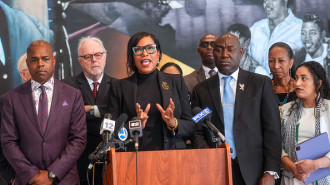Follow us on Twitter: @The_NewArab
Iranian who removed headscarf pardoned from prison sentence
A court sentenced Vida Movahed in March after finding her guilty of encouraging public "corruption", her lawyer, Payam Derefshan, told The Associated Press.
Movahed was arrested in November. Derefshan, who first revealed the verdict to local media on Sunday, said she is on a pardon list but the release procedures are still underway.
There was no official comment. Supreme Leader Ayatollah Ali Khamenei occasionally issues pardons, usually tied to public holidays.
Movahed, 32, was dubbed the "Girl of Enghelab Street" and briefly arrested in 2017 after she took off her headscarf and held it in the air.
Video clips of the protest were widely shared on social media, and authorities briefly detained 29 women on similar charges the following year.
Twitter Post
|
Three have reportedly been sentenced to two years in prison and some others are believed to have left the country. Iranian court proceedings are usually closed to the public and verdicts are often not publicised.
Iranian law requires women to dress conservatively and cover their hair in public. Those who violate the rules are usually sentenced to two months in prison or less and fined around $25.
Authorities have adopted a tougher approach toward the protests, which they say are part of a campaign orchestrated from abroad by opposition groups and social media networks.
Also on Sunday, the official IRNA news agency reported that an appeals court upheld the 13-year prison sentence of a lawyer who was jailed in 2018 after voicing support for people detained during anti-government protests.
Mohammad Najafi was sentenced in December to ten years for "conveying information to a hostile country" through interviews with foreign media, two years for insulting the supreme leader and one year for publicly supporting opposition groups.
The same appeals court reduced the sentence of his associate, Ali Bagheri, from 12 years to five years. He had faced similar charges.
The demonstrations in late 2017 and early 2018, which focused on economic grievances, lasted for days and resulted in the deaths of dozens and the arrest of hundreds more.







 Follow the Middle East's top stories in English at The New Arab on Google News
Follow the Middle East's top stories in English at The New Arab on Google News


